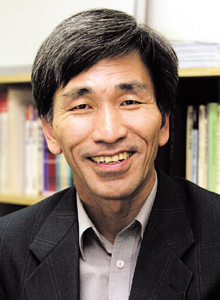Posted on : Dec.20,2006 15:25 KST
Jeong Hae-gu, SungKongHoe University Professor of Social Science
At a political debate this year, one question given a lot of attention was "whether democracy brings home the rice." Korea has become democratized and the current administration is of a democratic political faction, but the lives of everyday people are getting harder, and it would seem the question is one of self-scorn and expresses an ironic situation.
It doesn’t end there, because there is an increasingly strong tendency to want to bring back former dictator Park Chung-hee, known for having accomplished pressurized industrialization. Sometimes this is expressed in a vague sort of nostalgia, sometimes it is a "re-evaluation" of the Park era, and, going even further, you see it in deliberate attempts by some presidential wannabes to fashion themselves in his image ahead of next year’s presidential election. Call it the "Park Chung-hee syndrome."
Park’s legacy is, as everyone knows, highly disputed. That is because on the one hand he succeeded at high-speed industrialization and made the development Korea enjoys possible, but he also took power through a military coup, with many human rights abuses during his long dictatorship. And despite the success of Korea’s industrialization, the deep-rooted class and regional inequality it left in its wake continues to affect Korean society.
Why is it that we have this renewed debate and, even having achieved democracy, we have this sudden "Park Chung-hee syndrome" spreading all around? It is one reverberating result of what happens when there is a collapse of the hope placed in democratic elements that took power in what was itself an extension of the struggle for democracy and the fight against dictatorship, and when this leadership fails to contribute to better lives for the people. This mood of lost hope spread further when conservative elements began to take advantage of it.
Could the Park model from governments past and Park’s style of leadership serve as a real alternative for the present and future? Not a chance, and here’s why: Even if Park’s style of rule was an inevitable part of getting industrialization off to a late start, the development dictatorship model is fundamentally anti-democratic. Furthermore, we live in a different environment now, one that is democratic and global, and to depend on the state to play a leading role and exert its authority would no longer be effective.
What we need instead is to create a new kind of leadership, one that can build and lead a new developmental model that simultaneously achieves a free populace and economic growth in a context that is now both democratic and global.
Sadly, the "Government of the People" and the "Participatory Government," as the two governments formed by democratic political factions coined themselves, were both unsuccessful at this. By adopting the trends of neoliberalism, they actually did much to further socioeconomic disparity. The situation originates in how democratic elements and disappointment in the government failed to come up with alternatives in the changed environment of today.
Will Korea’s conservative elements able to come up with some new answers of their own? That would not be impossible, if they see the problems our society faces for what they are and seriously agonize over what to do about them. But they won’t get far by being so shallow as to try and get a free ride on the bandwagon of the Park Chung-hee syndrome.
The syndrome has come back from nowhere, and is spreading fast because our society lacks the ability to come up with answers for today and tomorrow. It is an especially ironic phenomenon when a democracy, so weak that it cannot find its own alternative models, desires to return to the past.
Please direct questions or comments to [englishhani@hani.co.kr]






